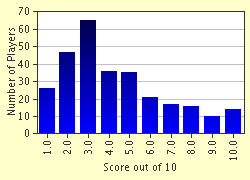Quiz Answer Key and Fun Facts
1. People have been translating bits and pieces of the Bible into English for centuries. Many of the early English translations were not full translations, but glosses. What's a gloss?
2. Partial translations into Old English were also available in the period before the Norman conquest. One English king had a number of passages translated into the vernacular and circulated, around the year 900. Who was it?
3. The first complete translation of the Bible into English was accomplished by John Wycliffe (or Wyclif - spelling varies). When?
4. The Latin Vulgate was the official translation for use in the Church, but in the 1490s its accuracy came into question when an Oxford professor read the four gospels in the original Greek. Who was he?
5. In 1516, this renowned theologian and scholar published a Greek-Latin Parallel New Testament which served to focus attention on just how inaccurate the Latin of the Vulgate was. Who was he?
6. This man holds the distinction of being the first to ever have his translation of the New Testament in English roll off the printing press.
7. With the establishment of the breakaway-from-Rome Church of England, King Henry VIII authorized an English translation of the Bible for use in churches. Who was the translator commissioned for this work?
8. An English translation of the Bible was completed in Geneva in 1557, and got its nickname from the odd description it gave of the clothing fashioned for themselves by Adam and Eve.
9. By the 1580s, the Roman Catholic Church ceded its authority over scripture and decided that if there were to be bibles in English, there would be an authorized Roman Catholic version in English, too. Where was this version produced?
10. The final round in the Battle of the Bibles was fired in 1605, when King James I of England and VI of Scotland authorized a new translation. Who wrote this translation?
Source: Author
Cymruambyth
This quiz was reviewed by FunTrivia editor
bloomsby before going online.
Any errors found in FunTrivia content are routinely corrected through our feedback system.

